Woman Flips Out On Husband's Spoiled Dog After His Behavior Got Out Of Control
Dogs are wonderful pets that usually behave according to the environment in which they are raised. Misbehaving dogs are typically victims of their owners, who enable their bad behavior by encouraging it or at least not attempting to correct it.
Some pet owners perceive certain bad habits of their pets as “adorable” and never seem to understand how these behaviors might make other people uncomfortable. When a dog only receives positive feedback after performing a certain action, it will believe that it is appropriate to do so and will expect no negative consequences.
Pet owners need to ensure that their pets are pleasant to be around before allowing them into any environment. If you cannot guarantee that your pet will behave appropriately around other people, they should be constantly monitored to prevent any accidents.
A Redditor who goes by the username u/Due_Traffic_7492 made a post on the r/AmItheAsshole subreddit, where she explained how her husband's dog is extremely spoiled and has some bad habits that her husband has enabled.
The user received a lot of replies from the Reddit community; scroll down to check out the full Reddit post and scroll a little further to read the comments from the original post.
Here's the original Reddit post by Reddit user u/Due_Traffic_7492:

The post was removed by Reddit for unknown reasons, but we were able to retrieve it through Reveddit:
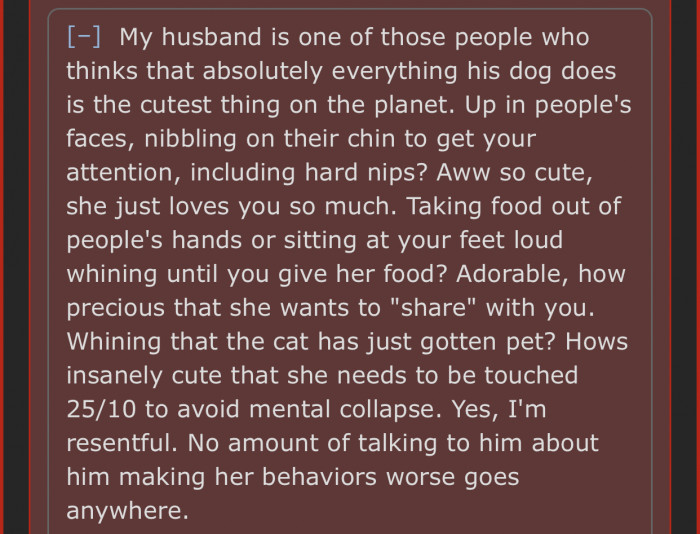
OP has a weight loss plan that was disrupted because of her husband's dog.

Understanding Attachment Styles
Dr. Jessica Moore, a developmental psychologist, explains that attachment styles significantly influence how individuals respond to their pets.
People with secure attachment styles may approach pet behavior with understanding, while those with anxious or avoidant styles might react more negatively.
This dynamic can create tension in relationships when differing attitudes toward pets collide.
Understanding Pet Ownership and Relationship Dynamics
Pet ownership often influences dynamics within relationships, particularly when one partner indulges a pet excessively. Behavioral psychologists suggest that this can stem from attachment issues, where individuals project their emotional needs onto their pets. Research indicates that such dynamics can create tension and conflict in relationships, particularly when expectations about pet behavior clash.
Understanding these dynamics is crucial for maintaining healthy relationships. Couples should openly discuss their expectations surrounding pet care and behavior to prevent misunderstandings.
Things eventually escalated to an infuriating point, and OP couldn't hold back anymore.
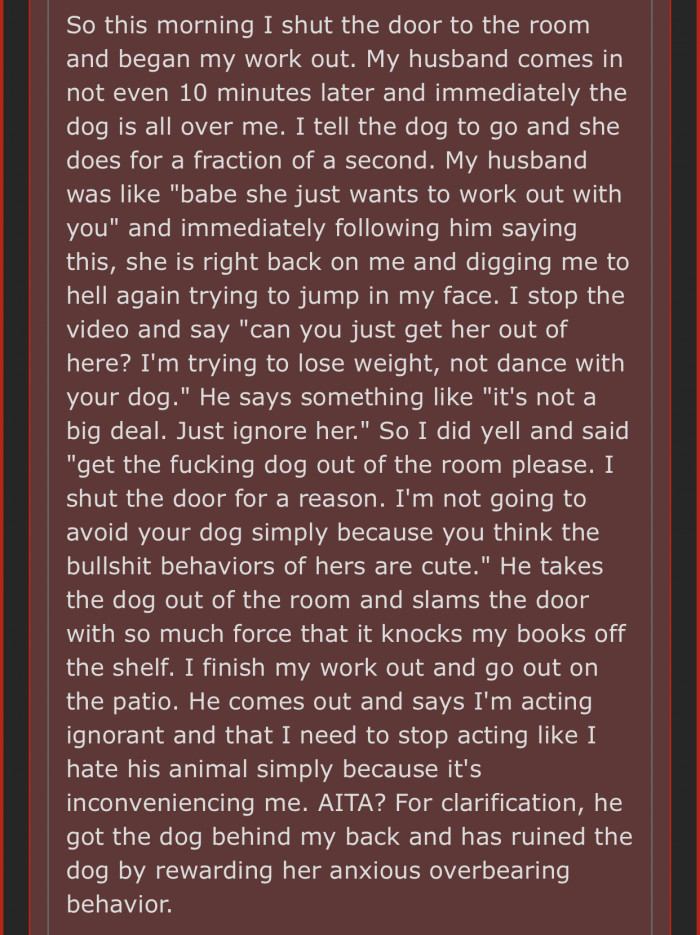
Here's how the Reddit community reacted to u/Due_Traffic_7492's post:

What you consider “cute” might lead to serious consequences.

Research in attachment theory shows that early relationships shape our expectations and responses in later relationships, including those with pets.
Individuals who experienced inconsistent caregiving may struggle with trust and react defensively to behaviors they perceive as threatening.
Recognizing these patterns can help individuals navigate their reactions more effectively.
Conflicts surrounding pets often reflect deeper relational issues. Studies published in the Journal of Family Psychology indicate that disagreements about pets can symbolize broader issues, such as control, responsibility, and differing values. When partners have different views on pet care, it can lead to feelings of frustration and resentment.
To address these underlying issues, it's important for couples to engage in open conversations about their values and expectations. By exploring these feelings together, partners can foster empathy and understanding.
The husband isn't on OP's team and is sabotaging her.

OP even confirmed that she had a feeling her husband was purposely sabotaging her.

The husband is endangering the dog by allowing it to behave this way.

The Role of Communication in Pet Ownership
Experts recommend that pet owners communicate their expectations and concerns to foster a harmonious living environment.
Using clear language to express feelings about pet behavior can lead to more productive discussions.
Additionally, engaging in regular check-ins can help roommates address emerging issues before they escalate.
Emotional Regulation in Stressful Situations
Emotional regulation is critical in managing conflicts, especially in high-stress environments. Research from Stanford University highlights the importance of recognizing and addressing emotions before they escalate into conflict. When individuals fail to regulate their emotions, it can lead to impulsive reactions and increased tensions.
In this situation, practicing techniques such as deep breathing or taking a pause before responding can help mitigate emotional responses. By fostering emotional awareness, individuals can approach conflicts more constructively.
OP is being treated worse than a dog.

This is widely over the top.
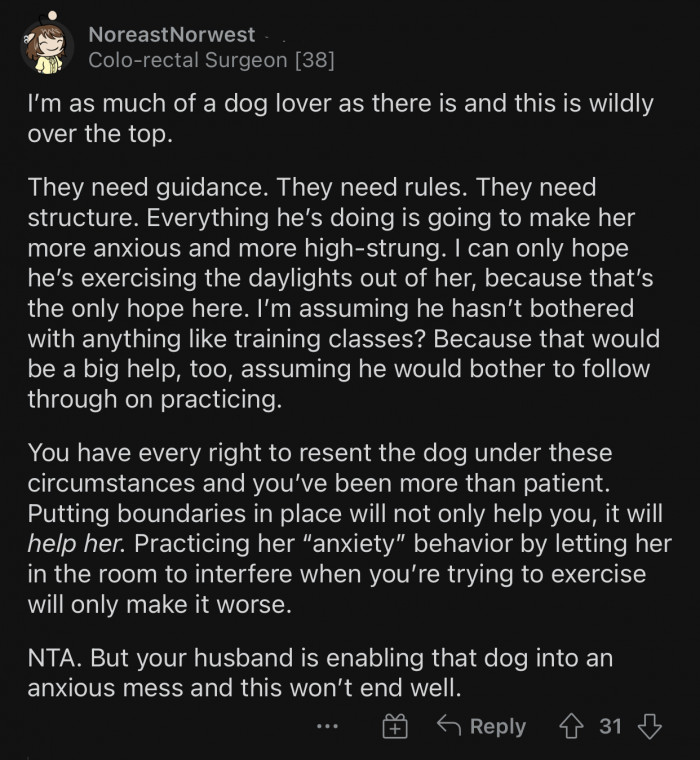
The issue here is not the dog but the husband.
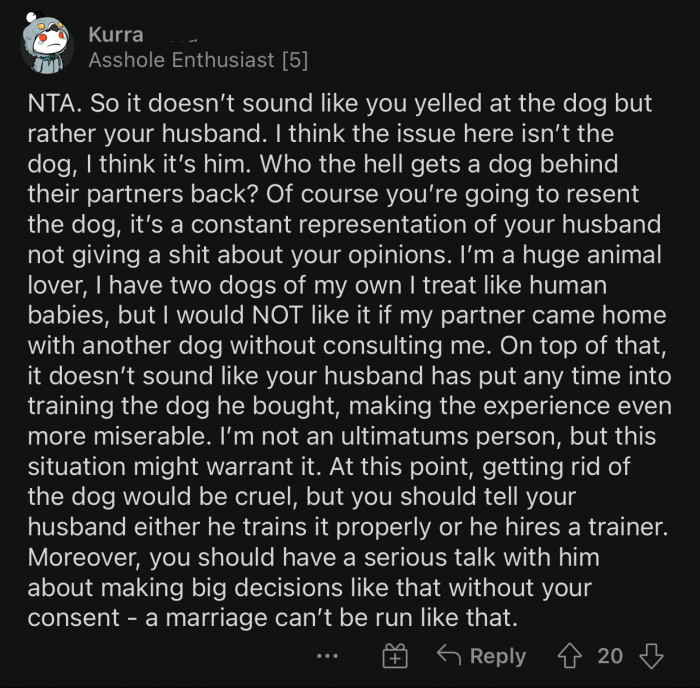
Behavioral research indicates that open communication can mitigate misunderstandings and reduce conflict.
When individuals feel comfortable expressing their feelings, the likelihood of a constructive resolution increases.
Creating a safe space for these discussions is essential for maintaining healthy relationships.
Effective communication is essential for resolving conflicts, particularly regarding differing expectations in pet care. Research indicates that utilizing active listening and empathy can significantly enhance communication between partners. According to studies published in the Journal of Applied Psychology, couples who engage in empathetic communication are better equipped to navigate conflicts successfully.
Encouraging open dialogue about feelings and expectations can promote understanding and reduce conflict, leading to healthier relationships.
The husband's behavior is extremely disrespectful.

Pets can sometimes get in the way.
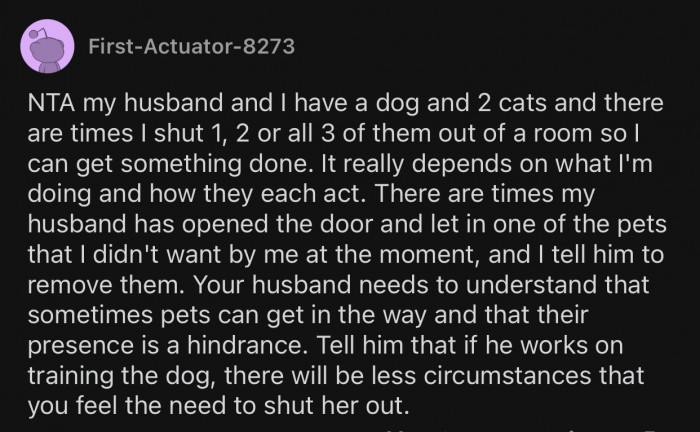
You need to make sure that your dog is pleasant to be around.

Finding Balance Between Pet and Human Needs
Achieving balance in pet ownership requires understanding the needs of both the pet and the humans involved.
Research suggests that when pet owners prioritize the well-being of their pets while also considering their own needs, it can lead to more satisfying relationships.
Roommates should work together to create an environment that respects the needs of all parties.
The husband is enabling the dog's bad behavior.
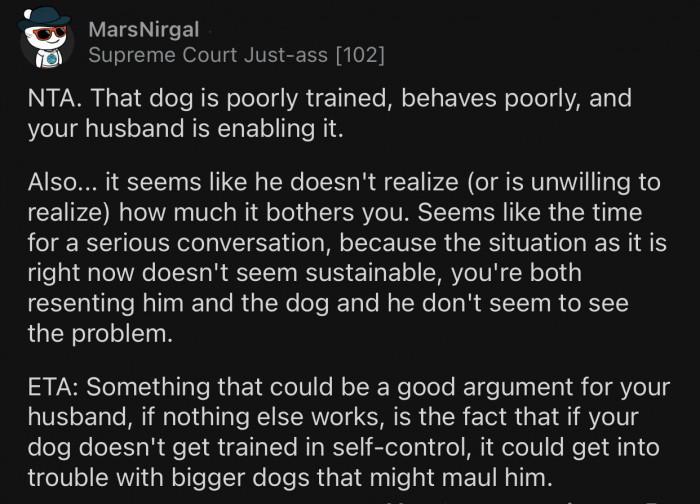
The bad behavior is cute until it isn't.
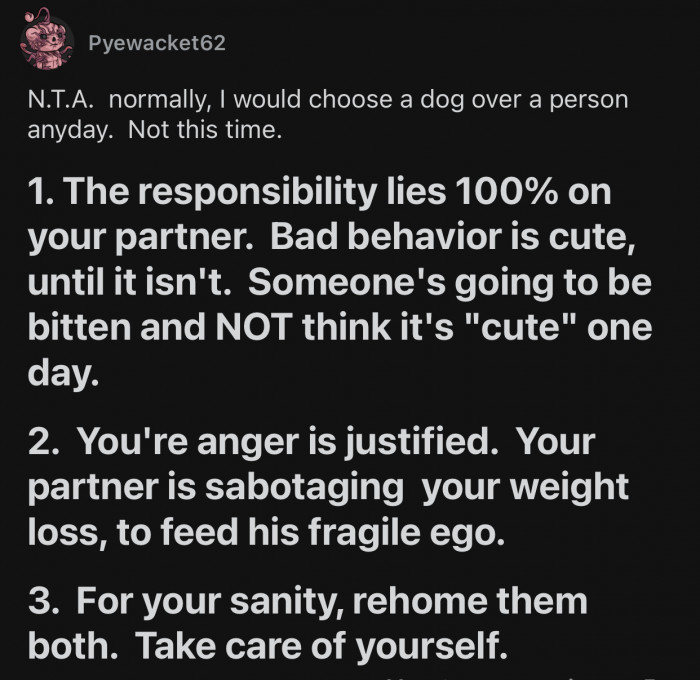
Boundaries need to be respected.
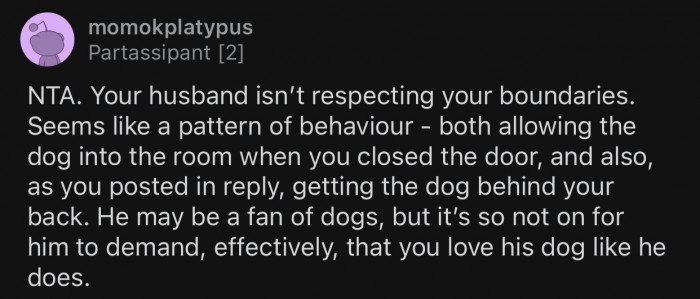
The whole situation OP is currently in is bad.

If the husband is enabling the bad behavior, there's nothing OP can do about it.

The dog is a member of the family.
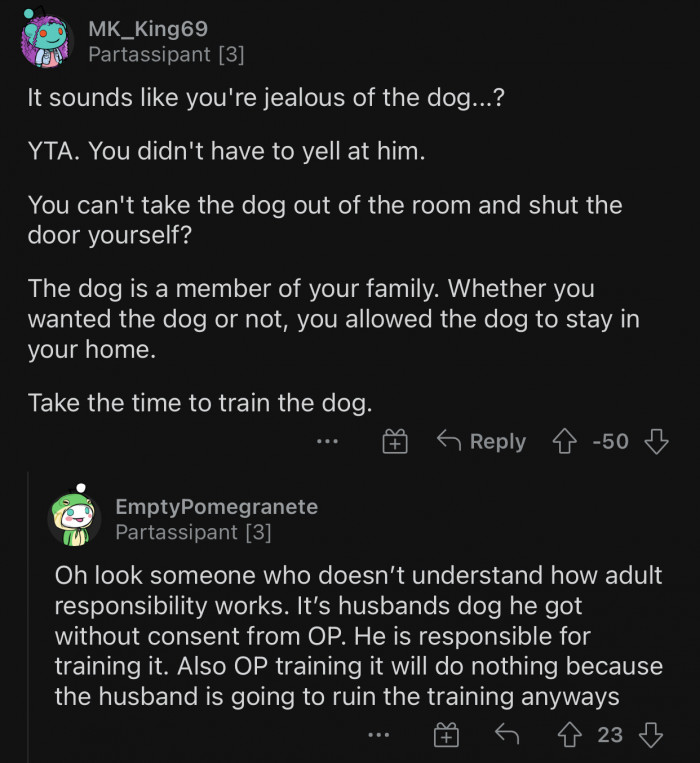
OP needs to confront her husband about his dog's bad behavior and how he is enabling it by not trying to correct it and even encouraging it.
OP's feeling that her husband might be trying to sabotage her could have some truth to it, and she needs to investigate the matter further. If you enjoyed this post, make sure to check out similar content on our platform.
Psychological Analysis
This situation illustrates the complexities of balancing pet ownership with relationship dynamics. When partners have differing expectations, it can lead to significant emotional distress. From a psychological standpoint, fostering open conversations about values and responsibilities is essential for maintaining harmony in relationships involving pets.
Analysis generated by AI
Analysis & Alternative Approaches
In conclusion, navigating relationships with pets requires a deep understanding of emotional dynamics and effective communication strategies. Research suggests that addressing underlying relational issues and practicing emotional regulation can significantly enhance conflict resolution. By fostering empathy and understanding, couples can create a more harmonious living environment despite the challenges posed by pet ownership.
Analysis & Alternative Approaches
Understanding the psychological factors that influence pet ownership can enhance relationships among roommates.
As research indicates, effective communication and a focus on mutual understanding are key to resolving conflicts.
Ultimately, finding a balance between pet care and human needs can foster a more harmonious living situation.



